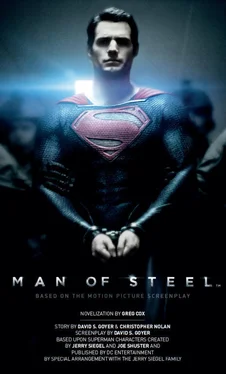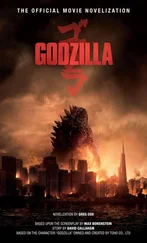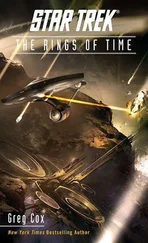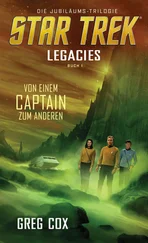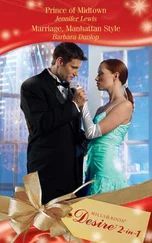Lois got out of the car and approached the farmhouse. A dilapidated wooden porch creaked beneath her feet. She knocked on the front door, which rattled under her fist. A handsome older woman, wearing an apron over a floral dress, opened the door. She eyed Lois warily.
“Mrs. Kent,” she said cheerily. “My name is Lois Lane. I’m with the Daily Planet.” Everybody knew the Planet, even out in the sticks. “I’d like to talk to you about your son.”
Martha Kent’s face fell—try as she might, she was unable to conceal her reaction. She inhaled sharply, and her hand went to her heart. Lois got the impression that the woman had been dreading this moment—most likely for more than three decades.
Looks like I’ve come to right place after all, she thought.

CHAPTER FIFTEEN
The Smallville cemetery was located on a gentle hillside overlooking the town. A spiked iron fence enclosed the peaceful graveyard. Weathered headstones of varying age jutted from a well-tended lawn. Fading flowers rested atop the more recent graves, and many of the older ones as well.
Twilight was falling as Lois contemplated the inscription on a modest granite marker.
JONATHAN NATHANIEL KENT
1951-1997
Beloved Husband and Father
A sudden wind rustled the branches of an old oak tree. Fallen leaves blew past her ankles. Footsteps sounded behind her, then stopped.
She turned around to find Clark Kent, a.k.a. “Joe,” standing there. Although he had shaved off his beard, she instantly recognized the enigmatic baggage handler who had saved her life up north.
I’d know those x-ray eyes anywhere.
She wasn’t surprised to see him. In fact, she’d been expecting this.
“I figured if I turned over enough stones, you’d eventually find me,” she said. “Once I knew what to look for, I started seeing a pattern. There’d be some kind of disaster. An earthquake, an oil rig failing… And a Good Samaritan would show up, doing things no human could possibly do.”
He didn’t deny it. He just watched her silently, as if waiting for the inevitable questions, which she was eager to supply.
“Where did you come from?” she said, and then the words just seemed to tumble out. “Why are you here? Let me tell your story.”
But he remained wary.
“What if I don’t want my story told?”
“It’s going to get out eventually,” she argued. “Someone’s going to photograph you. Or figure out where you live.”
Like I did, she thought.
“Then I’ll just disappear again,” he said.
“The only way you could disappear for good is if you stopped helping people altogether.” She looked him over, remembering how he’d saved her from that killer robot, and tended to her injuries afterward. “And I sense that’s not an option for you.”
He frowned. Clearly, she had touched a nerve.
“How’d you know that ship was there?” she asked.
“I’m not sure,” he admitted. “I just had a feeling. Something always drawing me north.” He gazed down at the tombstone before them. “My dad used to keep these clippings of UFO sightings…”
She could guess which ones. She had been researching the topic pretty thoroughly since her experiences on Ellesmere Island. She kept quiet, though, letting him talk as he finally started to open up.
“I was born on another world. I think you know that. But the Kents found me and raised me as their own. They taught me how to be human. How to do right by people.” He looked at her, his eyes piercing. “If you keep going down this road, you’ll make it harder for me to do that.”
He leaned over and brushed a fallen leaf off the tombstone.
“My father believed that if the world found out who I really was, they’d reject me out of fear. And then I’d never be able to fulfill my purpose. He died because of that belief…”
APRIL, 1997
“I need to be somewhere I can do some good, Dad.”
The Kent’s sturdy Jeep Wagoneer cruised down the highway. Clark, all of seventeen years and aching to get on with his life, rode shotgun beside his father. His mom was in the back seat with Shelby, their terrier pup, resting his furry head in her lap. They were taking I-35 to Wichita to visit relatives. Afternoon sunlight warmed the flat green terrain along the interstate.
“The Army’s not the right place for you, Clark,” Martha said from the back. “I don’t know what you’re thinking, anyway. You’d never even pass the physical.”
“She’s right,” Jonathan agreed, keeping his eye on the road. “There’s too much scrutiny.”
“And there’s not here?” Clark sulked in his seat. “Half the town’s already suspicious of me.”
It had been years, yet Lana had barely spoken to him since the bridge incident. People still walked on eggshells around him, when they weren’t giving him a hard time for being different.
“Fine,” Martha said. “Then go to college. We talked about that. Kansas State’s a safer bet, anyway—”
“I’m tired of ‘safe’.” He felt like he had been hiding forever. “I want do something useful with my life.”
His father bristled behind the wheel.
“So farming, feeding people, that’s not useful?”
Clark groaned and looked out the window. Not this old argument again…
“I didn’t say that,” he muttered. But it was too late. His dad launched into an all-too-familiar lecture.
“Our family’s been farming for five generations, Clark.”
“Your family, not mine,” Clark said sullenly. “I don’t even know why I’m listening to you. You’re not my dad. You’re just some guy who found me in a field.”
“Clark!” his mom protested.
“No, he’s right,” Jonathan said stiffly. He looked away from the road long enough to give Clark a stern look. “We’re not your parents. You don’t have to listen to us. We’re doing the best we can. And we’re making this up as we go along. So maybe our best isn’t good enough anymore.”
Clark already regretted his harsh words. The last thing he wanted was to hurt his parents’ feelings, no matter how confused—and frustrated—he felt sometimes. He knew his folks were just trying to protect him.
“Look, I’m sorry. I just—”
“Hold on!” Jonathan said sharply as he hit the brakes. Traffic had slowed to stop all along the highway. Dozens of cars and truck were backed up across multiple lanes. Hail fell from the sky, bouncing off pavement and windshields.
Uh-oh, Clark thought. This doesn’t look good.
His parents shared a worried look. Tornado season had just begun, and they were smack dab in the middle of “Tornado Alley.” Anybody who grew up in Kansas knew what a sudden change in the weather could mean. A storm, and a twister, could arrive from out of the blue.
A car was no place to be during a tornado. Worst came to worst, you were better off in a ditch than an exposed vehicle. Clark and his folks scrambled out of the SUV, joining hundreds of other travelers on the highway, which was now nothing but an endless parking lot.
The air was muggy and still, full of warm, moist air. Everyone was staring to the southwest, where ominous black storm clouds were racing toward them. The low-hanging clouds flattened along the tops, so that they resembled a blacksmith’s anvil. A wall of gray hung beneath the billowing, black thunderheads.
Then a funnel cloud dropped toward the vulnerable terrain below, snaking above the ground in a classic “stovepipe” shape. Tornado sirens sounded, warning everyone in the vicinity to seek cover.
Читать дальше
